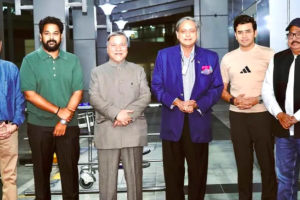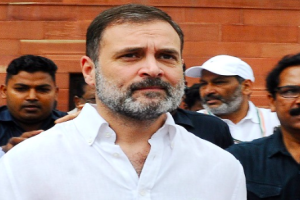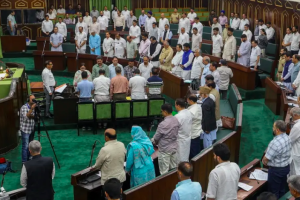A joke surfaced on social media after the 2019 Lok Sabha polls. A black-and-white photograph featuring that ultimate jewel of Bengali romantic films, Uttam Kumar with Suchitra Sen. She said, “Let us go somewhere, where only we will be alone and no one else there.” In response, Uttam Kumar said, “Then we should go to Alimuddin Street.”
I haven”t visited Alimuddin Street, the headquarters of the West Bengal CPI(M), in a long while. I still occasionally visit AKG Bhawan in Delhi, where I used to go to the rear bookstore to purchase the booklets of the accepted proposals of the central committee. I remember a time, when there was a constant crowd in the Delhi CPI(M) office, especially during the UPA era when it opposed the nuclear deal. There would be so many journalists that the party would have to organise a seating area outside with drinking water. People would come and go. One time, the former Tripura Chief Minister Manik Sarkar brought with him some very sweet pineapple for everyone. We shared the pineapple with him and discussed the art and craft of Left politics.
Today, former Chief Minister Buddhadeb Bhattacharya happens to be around – but his presence is not felt. I saw Bimanda (Biman Bose) Left Front chairman recently, going out into the scorching heat and working despite his age. It has been a while since Anil Biswas passed away suddenly. Pramaodbabu (Pramod Dasgupta) had created this next rung of leadership, but in this connection, I”d like to say something to Bimanda (hopefully, he won”t mind) – you didn”t create a second ”Buddha-Biman” duo for the next generation.
I can”t be overjoyed by this situation of politics in India. The pluralistic power of Indian democracy can last long long if Left politics survives. I continue to respect Karl Marx and love him as a philosopher. I respect him for the amount of hours, and amount of effort that went in, as he sat in the British library, studying day after day, to try and work and find a way to ease people”s suffering.
Marx was a humanist philosopher. The problem is that after him, Lenin, Stalin and Mao, together contorted this philosophy into a hegemony of static ideology.
The Communist Party was banned in our country for long. And for everyone in the party in Kolkata it was a day of elation when the ban was lifted. Kakababu used to cook very good meat and it was decided that he would cook up a feast for everyone, wrote Saroj Mukhopadhyay in his autobiography. “Listen, we are no longer banned. So go outside and put a party sign board. Make a letter head,” he had said to Kakababu.
Importantly, though, it wasn”t the ”Indian Communist Party” that was written. “The name of our party is the Communist Party of India (unit of comintern)”. Today, after so many years, some might feel that my words are too harsh, but it does seem to me that had the party been more interested in India”s sociocultural and religious traditions, instead of attempting to be a flagbearer of the international labour movement and the Soviet proleterian state. Had there been more Indianisation then perhaps the party would not have disappeared from the political scene and pushed towards oblivion by the RSS.
There are those who point to the case of the Meerut conspiracy as a turning point in history, ultimately allowing Stalin greater control over the Communist Party of India as all Indian communist leaders went to jail after that case. I don”t know, since this is the realm of scholarship, but it does seem sensible to me that if China can declare itself to be a Communist Party with Chinese characteristics then why couldn”t we?
We haven”t followed Karl Max”s idea of religion and atheism properly and after Lenin and Stalin”s declaration of an atheist state, we were deeply influenced by this. I remember when Lech Walesa”s movement for Church”s rebellion began in Poland, I was in college. A teacher, who was a party member and would spend most of his time at Alimuddin Street, argued that this religious movement was the US CIA”s operation. People didn”t respond in class.
But what happened in the end? The Soviet Union broke into pieces and there was the consequent Balkanisation. A few years ago, in China, I found out that they were restoring Buddhist pagodas, mosques, even the temples of ancient Confucius. That is why the party”s constitution also brought amendments through the party Congress.
The CPI(M) never had direct control at the centre, it was said that the limited power of the state was to operate under the policy of the centre. But today, when they are almost powerless what is the future of Indian politics? When Khrushchev switched from Stalinist fundamentalism to investing large sums of capital, the doctrine was criticized by by CPI(M) as revisionism. Meanwhile, China and the Socialist market adopted a liberal model of economics. Buddhadeb Bhattacharjee decided to introduce Deng Xiao Ping model in West Bengal without taking into account the actual ground realities. That backfired. The ghost of Tebhaga and Telangana is chasing the politics of India to date.
Today we are students again and the time has come to ask ourselves the same questions again and recalibrate. What then, of the theory of permanent revolution all over the world? So, was Khrushchev wrong again and Stalin right? Euro-Communism? What about leaders like Togliatti. Go back to when Rosa Luxemberg had told Lenin that the Menshevik”s slow moving policy needed to be further considered. But the Bolsheviks urgently wanted a revolution. Marx had argued that it was only through the womb of a mature capitalism that a proper desired revolution would come. But, instead, Lenin brought Socialism through the double promotion of feudalism. Western political scientists have said that Bolsheviks did a revolution in the year 1917 with the help of the Soviet army to chase out the Czars. Eric Hobsbawm wrote, before his death, not only of Gramsci”s hegemony, but that his idea on state and society needed a review.
The question is, are CPI(M)”s leaders ready?
Bhagawad Gita, Indian mythology, or the words spoken by Ramakrishna Dev”s Kathamrita are far and away, now there are many obstacles to reading Gramsci or Luxembourg. Few days back, I went to the Kolkata National Book Agency (the book shop run by the CPI(M) virtually) where I found that ”Lies of Krushchev” was being translated into Bengali and sold today, but not an Indian Marxist discussion about the thought of Rahul Sankritayan or Damodar Das Kosambi on Indian religion and society.
Some few years ago I went to see Karl Marx”s tomb in London. Nearby is the tomb of his daughter. Many foreign tourists come to see the tomb. Local guides say the Chinese crowd is the most. The British company is collecting tickets from visitors to show the tomb. In fact, every foundation, every organization, every party and their ideologies have to be changed over time. As Marx himself has stated, everything is in continuity, there is nothing like constant truth. Then why did nothing change at Alimuddin Street? Sitaram Yechury, speaking at Shankaracharya”s monastery in Kerala, spoke on Swami Vivekananda”s contribution to Indian thought. That”s great. Where is the difficulty for Biman Bose and Suryakanta Mishra? So many people worship god. While worshiping in the temple, people brief Thakur Masai (the priest) about their gotra. Who are these people?
Many letters were written by Gorky and Lenin on religion. Gorky said God didn”t create me. But I can create God. He is my god. He is a symbol of God”s goodness. Lenin replied angrily, “This is your petty bourgeois mentality.” Lenin was actually busy with another struggle . Maybe that”s why he was not encouraged by these religions and aesthetics. But Karl Marx had a huge interest in this, even had his son-in-law Lafargu too.
After all, I finish writing this by remembering an event from college life. In a village in Howrah, people called a quack to save a person who was bitten by a snake by blowing shrubs. An elderly Leftwing leader went there and said, “These are superstitions.” You have to take proper medicines. The villagers replied, Where is the medicine? This quack has saved me. Then the leader understood. “When we cannot provide him with alternative medical care, I cannot take away the psychological immunity or immune system of this superstition,” he said. That is exactly what Utpal Datta asked Dhritiman in Satyajit Ray”s film Agantuk. Which is civilization and which is barbarism?
Today, every political party says that abolishing poverty is Socialism. Modi himself is now establishing an anti-rich image. When Nehru came to Parliament after winning the first election, there was no opposition. Only 18 Communist MPs won at that time. And today? From West Bengal, BJP has brought 18 MPs! What will be the strategy of Indian Communists now? Thinking might be the best practice of CPI(M) Leaders now. But are they willing to?
(Jayanta Ghosal is a senior journalist. The views expressed are personal).
























